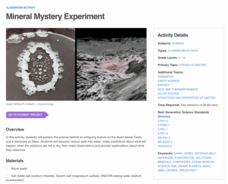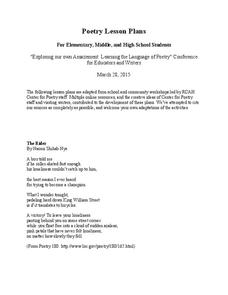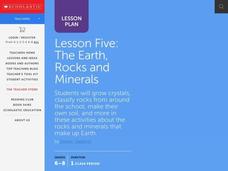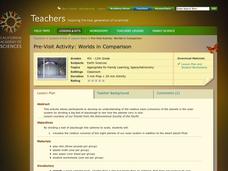Scholastic
Lesson One: The Earth, Background and Glossary
How much do you really know about our planet? Middle schoolers build up their prior knowledge about Earth, its placement in the solar system, its composition, and important geological vocabulary with an introductory earth science...
Scholastic
Lesson Two: The Earth, Introductory Activities
Determine what young pupils already know about earth science with a brainstorming activity. After class members work together to complete a KWL chart about the Earth, they craft an acrostic poem to demonstrate their understanding.
Scholastic
Lesson Three: The Earth, Movement in Space
If you feel like you're standing still, you're wrong! The Earth is constantly rotating and orbiting under our feet. Demonstrate the Earth's movement within the solar system with a collaborative activity. With a candle or lamp in the...
Astronomical Society of the Pacific
Toilet Paper Solar System
Can we model how large the solar system really is? Attempt an astronomical feat with a hands-on-activity that uses a roll of toilet paper. Young scientists measure the distances of the planets from the sun to create a scale model of...
Carnegie Mellon University
Introduction to Climate
Begin a full lesson on climate change by demonstrating how carbon dioxide gas contributes to increased temperatures. Be aware that pressure inside the antacid-containing bottle in Activity 2 may cause the lid to fly off; keep viewers at...
NASA
Mineral Mystery Experiment
One way to study something is to try to replicate it. Young scientists do just that as they use solutions to recreate mineral structures on a dwarf planet. They make solutions with different types of salt, evaporate them, and observe the...
Residential College in the Arts and Humanities
Poetry Lesson Plans
Need some ideas for poetry lessons? Check out this packet loaded with suggestions for elementary, middle, and high school writers.
California Academy of Science
Kinesthetic Astronomy: Mars Opposition Dance
Your class will watch as one child orbits the sun as Earth, while another orbits as Mars. If the timing is right, they will see the repetitive dance between the two planets and discover how often they are opposite from each other. For...
California Academy of Science
Kinesthetic Astronomy: Earth's Rotation
After completing the activity, "Kinesthetic Astronomy: The Meaning of a Year," zoom in on Earth's rotation using the same simulation setup and this outline. Each class member dons a map of the Western Hemisphere and plays the part of...
California Academy of Science
Kinesthetic Astronomy: The Meaning of a Year
How many times have you traveled around the sun? Aspiring astronomers grasp what a year is and they differentiate between orbit and rotation by walking around the sun right within your classroom. Place a lamp in the center of the room to...
California Academy of Science
Kinesthetic Astronomy: Longer Days, Shorter Nights
A lamp, four globes, and some signs taped around the room are all you need to set up a solar system simulation for teaching how Earth's tilted axis creates the seasons. (Sticky dots are also needed, but not mentioned in the materials...
Star Date
Astronomy Day from McDonald Observatory Solar System Scale Activity
Add a visual aid to your solar system lessons. Enthusiastic astronomers create a model depicting the nine planets and their distance from the sun.
Howard Hughes Medical Institute
Distribution of Elements in Earth’s Crust
How do scientists know the difference between a meteorite from space and a regular rock from the earth? Scholars read a passage and answer comprehension questions about the creation of the solar system. They extrapolate the main ideas to...
Oregon State
World Map of Plate Boundaries
Young geologists piece together the puzzle of plate tectonics in an earth science lesson. Given a physical map of the world, they search for land formations that indicate the location of different types of plate boundaries.
Laboratory for Atmospheric and Space Physics
A Classroom Solar System
Create a scaled model of our solar system in your classroom! Scholars work collaboratively to build paper mache planets and hang them in their proper position to showcase each planet's location in the solar system.
Scholastic
Lesson Five: The Earth, Rocks and Minerals
Apply the principles of geology to a series of collaborative, hands-on class activities. Young earth scientists learn more about igneous, metamorphic, and sedentary rocks before classifying and weathering rocks that they find....
Center for Math and Science Education
Solar System Launch
Trying to understand the vastness of outer space can be quite a challenge for young scientists. Help put things in perspective with this cross-curricular activity as students work in pairs creating scaled models of...
NASA
Make a Planetary Exploration Balloon
Balloons aren't just for parties! An inquiry-based lesson explores the idea of using balloons for space exploration. Learners become engineers as they attempt to control the ascent and descent of a helium balloon using different masses.
Pacific Science Center
Worlds in Comparison
Young astronomers follow a step-by-step procedure for dividing a lump of dough into parts, resulting in a scaled volume set of puny planets. Along with the printable directions is a template chart of planet names on which learners can...
Curated OER
Planet Facts
Students click on the links to planets to learn facts about them. In this planets lesson plan, students read about 8 of the planets in the Solar System.
Scholastic
Lesson Four: The Earth, Layers of Earth
Get your hands dirty with a set of earth science activities! Class members delve into a hard-boiled egg to find the similarities to the earth's layers, create a papier-mâché model of the earth, craft a simulation of the earth's...
NASA
Exploring Exoplanets with Kepler
Calculate the movement and properties of planets like professional astronomers! Scholars use Kepler's third law to find Mercury and Venus's distance from the sun. Using changes in brightness of distant stars and Kepler's third law,...
Baylor College
Modeling Earth's Atmosphere
Life on Earth is made possible by the unique composition of its atmosphere. Working collaboratively, a scale model is created as young scientists learn about the different layers of gas that surround the planet. Cards are included that...
New Mexico State University
Lab 6: Kepler's Laws
A 15-page package thoroughly teaches your physics or astronomy learners about Kepler's three laws of planetary motion. Each one is stated and explained. Class members answer questions, solve problems, and participate in the classic...























